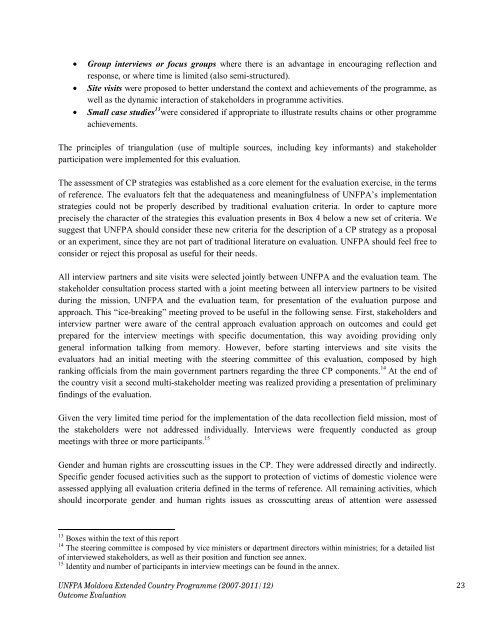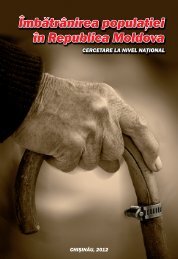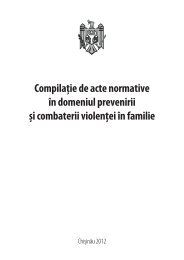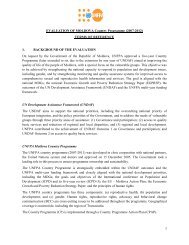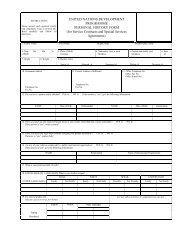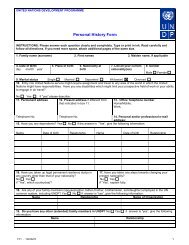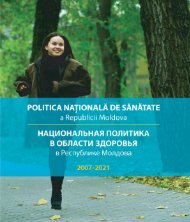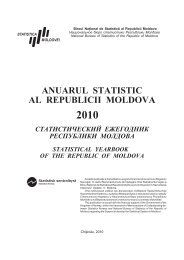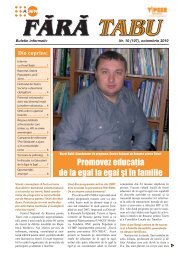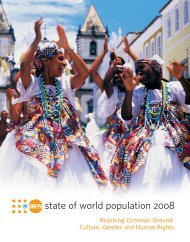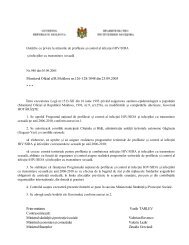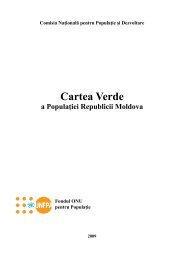Country Programme (2007-2011/2012) evaluation - UNFPA Moldova
Country Programme (2007-2011/2012) evaluation - UNFPA Moldova
Country Programme (2007-2011/2012) evaluation - UNFPA Moldova
You also want an ePaper? Increase the reach of your titles
YUMPU automatically turns print PDFs into web optimized ePapers that Google loves.
• Group interviews or focus groups where there is an advantage in encouraging reflection and<br />
response, or where time is limited (also semi-structured).<br />
• Site visits were proposed to better understand the context and achievements of the programme, as<br />
well as the dynamic interaction of stakeholders in programme activities.<br />
• Small case studies 13 were considered if appropriate to illustrate results chains or other programme<br />
achievements.<br />
The principles of triangulation (use of multiple sources, including key informants) and stakeholder<br />
participation were implemented for this <strong>evaluation</strong>.<br />
The assessment of CP strategies was established as a core element for the <strong>evaluation</strong> exercise, in the terms<br />
of reference. The evaluators felt that the adequateness and meaningfulness of <strong>UNFPA</strong>’s implementation<br />
strategies could not be properly described by traditional <strong>evaluation</strong> criteria. In order to capture more<br />
precisely the character of the strategies this <strong>evaluation</strong> presents in Box 4 below a new set of criteria. We<br />
suggest that <strong>UNFPA</strong> should consider these new criteria for the description of a CP strategy as a proposal<br />
or an experiment, since they are not part of traditional literature on <strong>evaluation</strong>. <strong>UNFPA</strong> should feel free to<br />
consider or reject this proposal as useful for their needs.<br />
All interview partners and site visits were selected jointly between <strong>UNFPA</strong> and the <strong>evaluation</strong> team. The<br />
stakeholder consultation process started with a joint meeting between all interview partners to be visited<br />
during the mission, <strong>UNFPA</strong> and the <strong>evaluation</strong> team, for presentation of the <strong>evaluation</strong> purpose and<br />
approach. This “ice-breaking” meeting proved to be useful in the following sense. First, stakeholders and<br />
interview partner were aware of the central approach <strong>evaluation</strong> approach on outcomes and could get<br />
prepared for the interview meetings with specific documentation, this way avoiding providing only<br />
general information talking from memory. However, before starting interviews and site visits the<br />
evaluators had an initial meeting with the steering committee of this <strong>evaluation</strong>, composed by high<br />
ranking officials from the main government partners regarding the three CP components. 14 At the end of<br />
the country visit a second multi-stakeholder meeting was realized providing a presentation of preliminary<br />
findings of the <strong>evaluation</strong>.<br />
Given the very limited time period for the implementation of the data recollection field mission, most of<br />
the stakeholders were not addressed individually. Interviews were frequently conducted as group<br />
meetings with three or more participants. 15<br />
Gender and human rights are crosscutting issues in the CP. They were addressed directly and indirectly.<br />
Specific gender focused activities such as the support to protection of victims of domestic violence were<br />
assessed applying all <strong>evaluation</strong> criteria defined in the terms of reference. All remaining activities, which<br />
should incorporate gender and human rights issues as crosscutting areas of attention were assessed<br />
13 Boxes within the text of this report<br />
14 The steering committee is composed by vice ministers or department directors within ministries; for a detailed list<br />
of interviewed stakeholders, as well as their position and function see annex.<br />
15 Identity and number of participants in interview meetings can be found in the annex.<br />
<strong>UNFPA</strong> <strong>Moldova</strong> Extended <strong>Country</strong> <strong>Programme</strong> (<strong>2007</strong>-<strong>2011</strong>/12)<br />
Outcome Evaluation<br />
23


